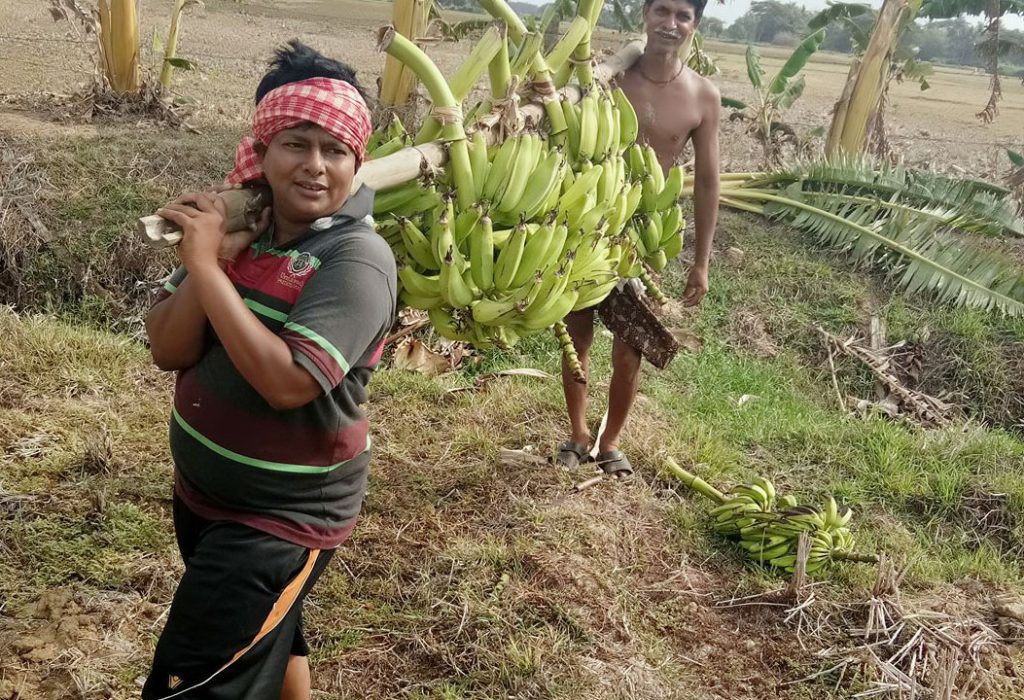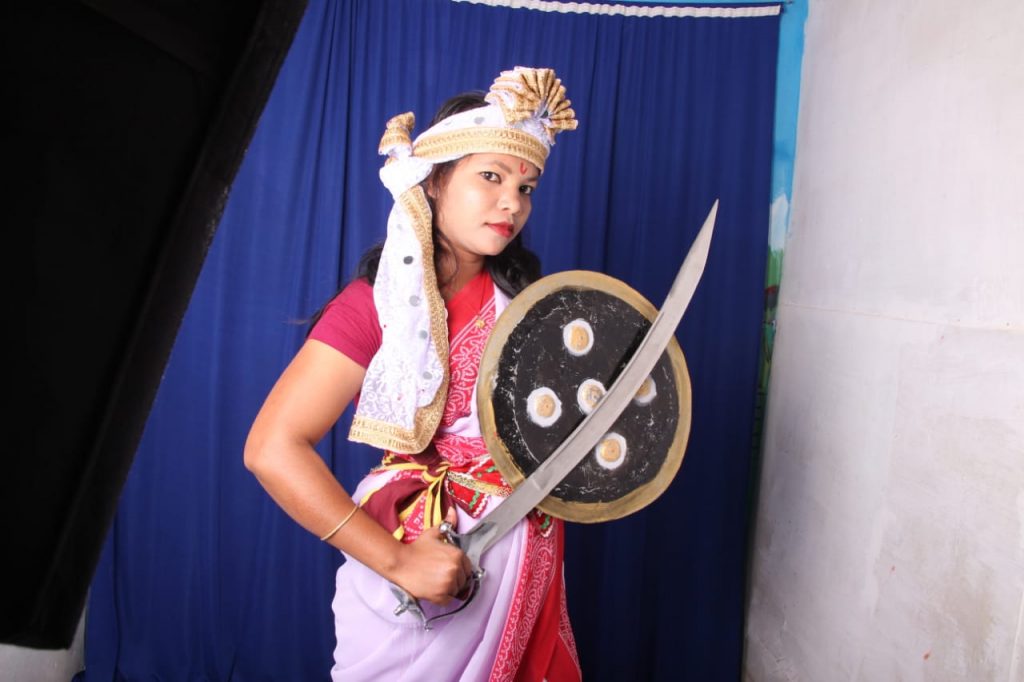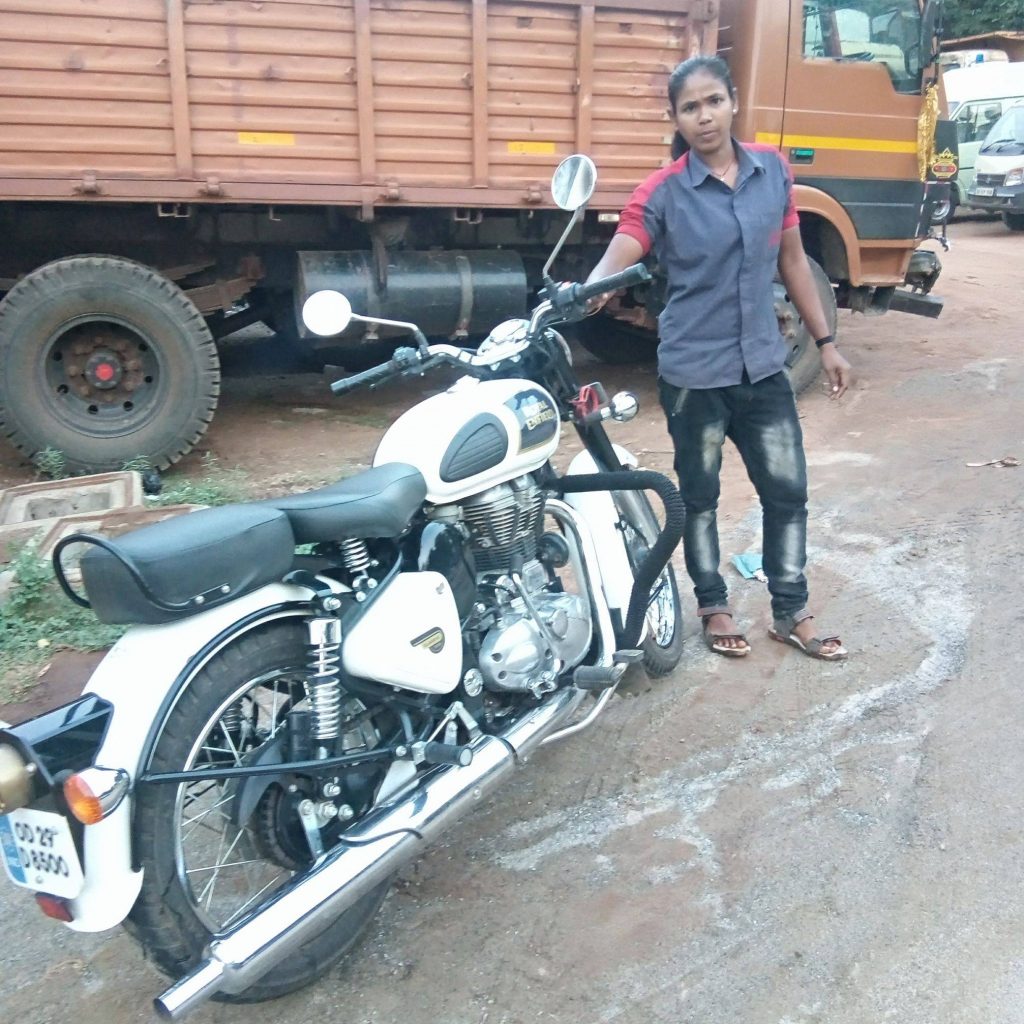Gone are the days when Indian women were confined to the four walls of the house. They are now making their presence felt in the realm of business and governance. They are also joining the armed and police forces in large numbers thereby disproving the long-held view that these were exclusively a male preserve. But, gender bias still runs deep. Orissa POST meets a few women who have overcome the gender divide to make their presence felt in occupations that were hitherto not considered suitable for them.
Babuni Sahoo
She has masters’ degrees in Political Science, MSW and MJMC apart from an LLB degree. She is also a state-level cricket player. Yet, she has chosen to be a farmer. Meet Babuni Sahoo from Balipatna, Bhubaneswar. With a boyish look, attitude and demeanour, you can find Babuni zooming around her village and nearby places on her Avenger or riding a tractor.
She gets up at the crack of dawn and leaves for her paddy field spread over 14 acres. Her day starts and ends with farm activities. Be it postharvest operations like drying, winnowing, selecting and storing seeds, or pre-harvest operations like sowing seeds and spraying pesticides, she does it all on her own. Apart from that, she does all the household chores such as cooking and collecting water. Though she is a girl, everyone in her village addresses her as Babuni Bhai or mamu.

Asked what made her choose a boy’s lifestyle, Babuni says, “I was the youngest one in my family. I don’t know when and how I got habituated to dressing up in boys’ clothes. In the process, I always considered myself as a boy. When I got admission in Nimapara Girls’ High School, I was forced to put on girls’ clothes. As I did not want to join the school, I always bunked class. I would leave home at 9.30 am and instead of heading for school, go to the nearby jungles, change my school uniform and put on a short pant and T-shirt. One day, the school headmaster informed my father that I was bunking school. So, my father admitted me in a co-ed school. Besides, I loved to play with boys and sit with them in the classroom. Girls are concerned about their looks, but I never was. In another incident, I participated in a racing competition when I was pursuing graduation in BJB College. When I took my position for the race, the sports teacher intervened and asked me to leave the ground as it was a girls’ competition. However, the sports secretary came to my rescue saying, ‘Sir, she is a girl. Let her participate.’ Many a time, bus conductors have asked me to vacate the seat meant for ladies assuming I was a boy. There is a strong reason behind my donning a boyish look and that is safety. Nowadays, women are not safe at all. But, I find myself safe and can give a fitting reply if anybody attacks me. So many times, I have travelled on my bike from Bhubaneswar to my village and nobody dared to attack me.”
Why farming? “When I was in school, my father always took me to the paddy fields. I watched him doing all sorts of farming activities all day. It was the smell of the land that drew me towards the paddy fields. These fields are picturesque, and the only thing more beautiful is the ‘smell’ that makes me feel poetic. I started assisting my father in farming activities when I was in Class IV. When my siblings were busy playing and merrymaking, I loved to be with my father and help him to sow seeds and plant saplings. Farming is something that comes to me naturally.”
She continues: “Young people always dream of pursuing a cushy job with a handsome salary. But no one thinks of becoming a farmer. They are of the view that it is not profitable. I must say that if you cannot give your hundred per cent and work like a farmer, you cannot be a successful farmer.”
Babuni cultivates paddy on 14 acres of land besides planting nearly 1,000 banana trees and 500 papaya trees every year. She bought an Avenger bike from the money she made by selling bananas. She uses modern technology to get a good harvest. She is also into fish farming. For her success in farming and setting an example for others, she has been felicitated by Chief Minister Naveen Patnaik on the occasion of Akhi Trutiya. Besides, she has won awards like the state excellency award for cultivation given by the National Human Rights Council of India, Sampurna award by transgender activist Mira Parida, Odisha Pratibha Samman by Kalinga Yuva Mahotsav, Krushi Bandhu award by Women in Society Help, Change Agent of Odisha award by Yes We Can and best farmer award by L &T Global, among others.
Babuni is very passionate about riding her bike. “I was in Class V when my father met with an accident and his left hand was injured seriously. I used to carry my father on my bicycle to different places for farming related work. As it was time consuming, I learnt to ride a Luna. I really enjoy riding the bike.”
Apart from being a farmer, Babuni was also sarpanch of Kuranjipur panchayat between 1997 and 2002 and Zila Parishad member between 2012 and 2017.
Bibhusita Das
Odisha’s first woman marine engineer, Bibhusita Das hails from Cuttack. As a little girl, she loved poring over colourful pictures of the seas, beautiful tropical islands and bustling port cities around the world. She dreamt of being a globetrotter and wished she had a ship to sail. “It was my wish to do something different from routine jobs. I loved reading stories about sea voyages and expeditions. And the job of a mariner seemed to be a natural choice. Initially, everyone seemed apprehensive about my storming a male bastion but my family members, especially my parents, despite having no link with the shipping or marine sector encouraged me to follow my passion,” says Bibhusita with a chuckle.

She adds: “The road to success was not easy, but with hard work, drive and passion, I made it possible. I had defied societal pressure and conventions to go to work on a cargo ship, MV Biswamalhar. My family, especially my father Karunakar Das, a retired BSNL employee, was very supportive.”
After completing a four-year B Tech course in marine engineering at CV Raman Engineering College in Bhubaneswar in 2007, Bibhusita worked as a lecturer in Tirunelveli for six months. In 2008, she got the job of fourth engineer in Shipping Corporation of India, the country’s largest shipping company, and within eight days got promotion to third engineer.
“While pursuing engineering, there were seven girls in our batch, but I was the only girl who opted for onboard sailing. One of my teachers used to tell me, ‘No company is going to hire you because you are a girl. The shipping sector has mostly remained exclusive for men.’ His words had no impact on me because I was sure about my ambition and aspiration. I opted for onboard sailing almost throughout the year.”
Recollecting her first stay on board, she says: “It was tough but very exciting. The fact that I was the lone woman officer in the crew wasn’t a problem. When I joined my first vessel going from Chennai to Port Blair in 2008, I developed sea sickness. My master mariner was not impressed. The mariners on board thought that I had made a mistake in choosing a rigorous profession. Being a woman, they felt that I may not be able to withstand prolonged sailing and sea exposure. But I stuck to the task with tenacity and renewed vigour. I have proved them wrong.”
Recalling a memorable experience, Bibhusita says, “When I was on a cargo ship, a cyclone hit the sea when there was just a day left to reach the US. I was there when the alarm rang in the main engine. I sorted out the engine problem without taking help from anyone and earned the appreciation of the chief engineer. He said, ‘I never expected that you would sort out this kind of major problem. When you joined me as my subordinate, the immediate thought that came to my mind was that a lady engineer would increase my workload. I was wrong. You are capable of doing things which only men can.’ These words really meant a lot to me and boosted my morale.”
Sunita Behera
She was once a shy girl but is now a confident young lady. Twenty-six year old Sunita Behera is empowering the fairer sex by training them in martial arts for self-defence. At a time when there is widespread concern about the safety of women and girls outside the home and in the workplace, the Kalinga Kanya Paika Akhada founded by her is imparting training to girls on life-saving self-defence techniques and advanced self-defence techniques and strategies. Besides, empowering girls in her locality, the Khurda-based Sunita is also promoting martial arts across the country.
Paika Akhada is the traditional martial arts of Odisha. Literally, ‘Paika’ means soldier or warrior or fighter while ‘Akhada’ means the training centre. Odisha has a long martial arts tradition. Importantly, men used to be paikas, not women. But by forming the Kalinga Kanya Paika Akhada, Sunita is taking forward the age-old martial arts tradition and also making women and girls stronger to fight any adversity in life.

Sunita’s martial art skills were identified by her teachers at Janata College in Kuhudi. “In December 2012, a special national service camp was organised by the College in Khurda, in which I along with 14 other girls participated. A Paika guru imparted training to us. The guests at the camp were taken aback by the self-defence tactics displayed by me. Later, I founded the Kalinga Kanya Paika Akhada,” she says.
“The motto of the institute is to empower women and girls so that they can protect themselves in society and lead a fearless life. Apart from judo and karate, women and girls are imparted training in sword-fighting, stick-fighting and other forms of martial arts,” she adds.
The members of Kalinga Kanya Paika Akhada have showcased their fighting skills in Arunachal Pradesh, Mizoram, Delhi and Kerala and brought honours to the district at national level. Besides, they have performed in the Khurda Mahotsav, Sishupalgarh Mahotsav and Bolgarh Mahotsav.
Champarani Maharana
Meet 24-year-old Champarani Maharana who works as a mechanic at a Royal Enfield showroom at Patrapada in Bhubaneswar. Talking about her love for bikes, she says, “Everyone learns to ride a cycle before riding bikes. However, I am an exception. I learnt bike riding first, thanks to my father. Frankly speaking, my father is addicted to alcohol. He loses his balance and seeks my help to reach home every night. Even very late at night, he calls me to pick him up from different places. This has been a daily affair in our home. I remember I was in Class VIII when he sought my help to reach home. When I reached the spot, he asked me to drive his Passion Pro bike. I was taken aback to hear him saying, ‘You ride and I will be your pillion rider.’ I told him: ‘Bapa, I don’t know riding.’ He slapped me, saying, ‘Just ride it and we will reach our destination.’ I did what he asked me to do. But as expected, we met with an accident and my father fell from the bike.”

The father-daughter duo sustained injuries in the accident. Following the mishap, Champarani thought that her father would no longer ask her to bring him back home. But she was wrong.
“When I attempted to ride the bike for the second time, I got injured again. But he continued to call me when he got drunk. As they say, practice makes a man perfect, so I also became a good driver through rigorous practice.”
Asked what made her join the Royal Enfield showroom, she replies: “I joined the showroom in 2015 after quitting my education midway. I was pursuing Plus III final year when I stopped going to college due to financial problems. Being the eldest child, I had to do something to support my family. As I was good at riding bikes, it was one of my relatives who suggested that I join the Royal Enfield showroom so that I can follow my passion and eke out a living.”
Champarani had to face sceptic customers during her initial days at the showroom. “A customer had come to get his bike repaired. When our manager assigned me to fix the problem, he was doubtful whether I could do it. He approached the manager requesting him to assign some other mechanic. My manager had confidence in my skills and told the customer to have faith in me. And I successfully fixed all the problems. Since then, I have never looked back,” she says.
RASHMI REKHA DAS, OP






































